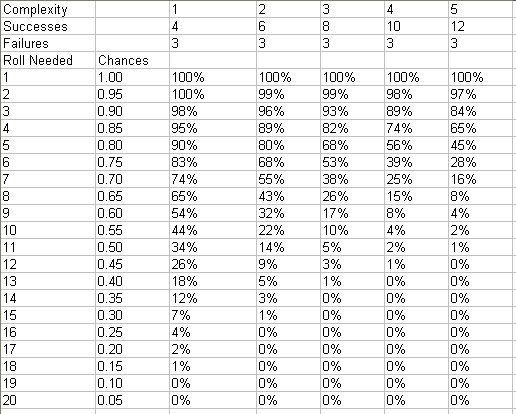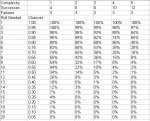themagister
First Post
Skill Challenges in 4e can be modeled using the negative binomial distributions, as others have commented. I was curious what the odds of overall success was at the various Complexities, and I had a sneaking suspicion the d20 roll was too important.
We define a function, f, that is the probability of achieving a number of successes, S, before achieving a number of failures, F, given that each independent skill check has a probabilty of success, p(S). The overall probability of success is the sum of f where F=0, 1, 2:
sumf = negativebionomialdist( S, F=0, p(S) ) +
negativebionomialdist( S, F=1, p(S) ) +
negativebionomialdist( S, F=2, p(S) )
I won't go into the derivation, but this is equivalent to:
sumf = 1 - cumulative_bionomialdist( S-1, (F-1) + S, p(S) ) where F=3
We can then generate a chart showing the overall odds of success by the Complexity (columns) and dice roll needed to succeed (rows). By the last term, I mean after the Trained, etc, modifiers are applied, there is a certain number you have to "hit" on a d20 to succeed. Often, this will be 10 (moderate DC's) minus Trained, Attribute, cooperation, etc. bonuses.
The chart is available as an attachment (JPG). How to make nice tables in this BB system is beyond me. You can also download a tool to make these calculations yourself (XLS).

We can see that for a Complexity 1 (third column), if a "5" is needed for all of the skill checks, there's a 90% chance that the party will succeed at the Skill Challenge. In contrast, for a Complexity 5 (last column), a "5" translates to overall odds of 45%. What's happening? Well, as the Complexity rises, the total number of die rolls go up. This increases the chances that three of them will be failures.
I interpret this to mean that, for a Complexity 5 encounter, if the characters have to regularly roll higher than "3", there's fair to good odds they won't succeed. It's dramatic how fast the party's chances drop, and it has everything to do with the number of skill checks.
Comments please, but let me anticipate a few questions:
1) "But, each skill check failed or succeed changes the outcome!" No, the checks are independent. Cooperative checks, where characters help out other characters don't contribute to successes or failures. These are just bonuses to the "important" checks.
2) "But, I think your math is wrong!" That's nice--prove it. Take a look at binomial distribution functions and Bernoulli trials, and come back to me with something substantial. You might be right, but I'm going to need to see your work.
3) "But, my <insert homegrown system name> fixes all this!" Great, but that's off-topic. Let's establish what the issues are and really understand them before attempting a fix.
4) "But, the Skill Challenge system is bogus for other reasons!" Maybe, sure, but that's off topic.
5) "But, that's another reason why Fourth Edition is so bad!" Super, great. Take it to another thread.
We define a function, f, that is the probability of achieving a number of successes, S, before achieving a number of failures, F, given that each independent skill check has a probabilty of success, p(S). The overall probability of success is the sum of f where F=0, 1, 2:
sumf = negativebionomialdist( S, F=0, p(S) ) +
negativebionomialdist( S, F=1, p(S) ) +
negativebionomialdist( S, F=2, p(S) )
I won't go into the derivation, but this is equivalent to:
sumf = 1 - cumulative_bionomialdist( S-1, (F-1) + S, p(S) ) where F=3
We can then generate a chart showing the overall odds of success by the Complexity (columns) and dice roll needed to succeed (rows). By the last term, I mean after the Trained, etc, modifiers are applied, there is a certain number you have to "hit" on a d20 to succeed. Often, this will be 10 (moderate DC's) minus Trained, Attribute, cooperation, etc. bonuses.
The chart is available as an attachment (JPG). How to make nice tables in this BB system is beyond me. You can also download a tool to make these calculations yourself (XLS).
We can see that for a Complexity 1 (third column), if a "5" is needed for all of the skill checks, there's a 90% chance that the party will succeed at the Skill Challenge. In contrast, for a Complexity 5 (last column), a "5" translates to overall odds of 45%. What's happening? Well, as the Complexity rises, the total number of die rolls go up. This increases the chances that three of them will be failures.
I interpret this to mean that, for a Complexity 5 encounter, if the characters have to regularly roll higher than "3", there's fair to good odds they won't succeed. It's dramatic how fast the party's chances drop, and it has everything to do with the number of skill checks.
Comments please, but let me anticipate a few questions:
1) "But, each skill check failed or succeed changes the outcome!" No, the checks are independent. Cooperative checks, where characters help out other characters don't contribute to successes or failures. These are just bonuses to the "important" checks.
2) "But, I think your math is wrong!" That's nice--prove it. Take a look at binomial distribution functions and Bernoulli trials, and come back to me with something substantial. You might be right, but I'm going to need to see your work.
3) "But, my <insert homegrown system name> fixes all this!" Great, but that's off-topic. Let's establish what the issues are and really understand them before attempting a fix.
4) "But, the Skill Challenge system is bogus for other reasons!" Maybe, sure, but that's off topic.
5) "But, that's another reason why Fourth Edition is so bad!" Super, great. Take it to another thread.
Attachments
Last edited:



